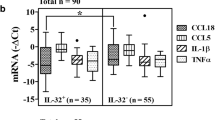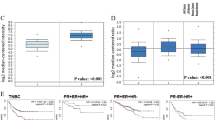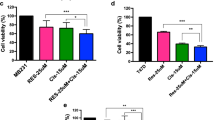Abstract
Cervical cancer (CC) is a gynecological malignant tumor worldwide. Astragaloside IV (AS-IV) has been found to exert antitumor effects on CC. In addition, M2-polarized macrophages, known as tumor-associated macrophages (TAMs), play an important role in promoting cancer cell growth and angiogenesis. Thus, we explored the association between the antitumor effect of AS-IV and macrophage polarization in CC. Flow cytometry, ELISA, and RT‒qPCR assays were applied to detect the levels of CD163, IL-10, TGFβ, and CD206 in M2 macrophages with or without AS-IV treatment. In addition, conditioned medium (CM) was collected from these M2 macrophages, and CC cells were then cultured in various CMs. Wound healing and transwell assays were used to assess the migratory ability of CC cells. In this study, we found that AS-IV significantly inhibited M2 polarization of macrophages, as shown by decreased CD163, IL-10, TGFβ, and CD206 expression. In addition, compared with CM from M2 macrophages, CM from AS-IV-treated M2 macrophages notably inhibited angiogenesis, migration, and epithelial-mesenchymal transition (EMT) in CC cells. Furthermore, compared with CM from M2 macrophages, CM from AS-IV-treated M2 macrophages markedly reduced p-Smad2 and p-Smad3 protein expression in CC cells, and these changes were reversed by TGF-β treatment. Collectively, suppression of M2-like polarization of macrophages by AS-IV could prevent the migration and EMT of CC cells by inactivating TGF-β/Smad2/3 signaling. These findings might provide some theoretical support for exploring novel treatments for CC.





Similar content being viewed by others
Data availability
The datasets used and/or analyzed during the current study are available from the corresponding author on reasonable request.
References
Arneth B (2019) Tumor microenvironment. Medicina (Kaunas) 56. https://doi.org/10.3390/medicina56010015.
Auyeung KK, Han QB, Ko JK (2016) Astragalus membranaceus: a review of its protection against inflammation and gastrointestinal cancers. Am J Chin Med 44:1–22. https://doi.org/10.1142/s0192415x16500014
Chen Y, Zhang S, Wang Q, Zhang X (2017) Tumor-recruited M2 macrophages promote gastric and breast cancer metastasis via M2 macrophage-secreted CHI3L1 protein. J Hematol Oncol 10:36. https://doi.org/10.1186/s13045-017-0408-0
Chen D, Xie J, Fiskesund R, Dong W, Liang X, Lv J, Jin X, Liu J, Mo S, Zhang T, Cheng F, Zhou Y, Zhang H, Tang K, Ma J, Liu Y, Huang B (2018) Chloroquine modulates antitumor immune response by resetting tumor-associated macrophages toward M1 phenotype. Nat Commun 9:873. https://doi.org/10.1038/s41467-018-03225-9
Choi J, Gyamfi J, Jang H, Koo JS (2018) The role of tumor-associated macrophage in breast cancer biology. Histol Histopathol 33:133–145. https://doi.org/10.14670/hh-11-916
Cui X, Jiang X, Wei C, Xing Y, Tong G (2020) Astragaloside IV suppresses development of hepatocellular carcinoma by regulating miR-150–5p/β-catenin axis. Environ Toxicol Pharmacol 78:103397. https://doi.org/10.1016/j.etap.2020.103397
Fu XH, Li JP, Li XY, Tan Y, Zhao M, Zhang SF, Wu XD, Xu JG (2022) M2-macrophage-derived exosomes promote meningioma progression through TGF-β signaling pathway. J Immunol Res 2022:8326591. https://doi.org/10.1155/2022/8326591
Gambardella V, Castillo J, Tarazona N, Gimeno-Valiente F, Martínez-Ciarpaglini C, Cabeza-Segura M, Roselló S, Roda D, Huerta M, Cervantes A, Fleitas T (2020) The role of tumor-associated macrophages in gastric cancer development and their potential as a therapeutic target. Cancer Treat Rev 86:102015. https://doi.org/10.1016/j.ctrv.2020.102015
Genin M, Clement F, Fattaccioli A, Raes M, Michiels C (2015) M1 and M2 macrophages derived from THP-1 cells differentially modulate the response of cancer cells to etoposide. BMC Cancer 15:577. https://doi.org/10.1186/s12885-015-1546-9
Gunassekaran GR, PoongkavithaiVadevoo SM, Baek MC, Lee B (2021) M1 macrophage exosomes engineered to foster M1 polarization and target the IL-4 receptor inhibit tumor growth by reprogramming tumor-associated macrophages into M1-like macrophages. Biomaterials 278:121137. https://doi.org/10.1016/j.biomaterials.2021.121137
Hu Z, Ma D (2018) The precision prevention and therapy of HPV-related cervical cancer: new concepts and clinical implications. Cancer Med 7:5217–5236. https://doi.org/10.1002/cam4.1501
Hu S, Zheng W, Jin L (2021) Astragaloside IV inhibits cell proliferation and metastasis of breast cancer via promoting the long noncoding RNA TRHDE-AS1. J Nat Med 75:156–166. https://doi.org/10.1007/s11418-020-01469-8
Kim J, Bae JS (2016) Tumor-associated macrophages and neutrophils in tumor microenvironment. Mediators Inflamm 2016:6058147. https://doi.org/10.1155/2016/6058147
Li L, Zhang R, Yang H, Zhang D, Liu J, Li J, Guo B (2020) GDF15 knockdown suppresses cervical cancer cell migration in vitro through the TGF-β/Smad2/3/Snail1 pathway. FEBS Open Bio 10:2750–2760. https://doi.org/10.1002/2211-5463.13013
Liontos M, Kyriazoglou A, Dimitriadis I, Dimopoulos MA, Bamias A (2019) Systemic therapy in cervical cancer: 30 years in review. Crit Rev Oncol Hematol 137:9–17. https://doi.org/10.1016/j.critrevonc.2019.02.009
Liu Z, Kuang W, Zhou Q, Zhang Y (2018) TGF-β1 secreted by M2 phenotype macrophages enhances the stemness and migration of glioma cells via the SMAD2/3 signalling pathway. Int J Mol Med 42:3395–3403. https://doi.org/10.3892/ijmm.2018.3923
Liu F, Ran F, He H, Chen L (2020a) Astragaloside IV exerts anti-tumor effect on murine colorectal cancer by re-educating tumor-associated macrophage. Arch Immunol Ther Exp (warsz) 68:33. https://doi.org/10.1007/s00005-020-00598-y
Liu Q, Yang C, Wang S, Shi D, Wei C, Song J, Lin X, Dou R, Bai J, Xiang Z, Huang S, Liu K, Xiong B (2020b) Wnt5a-induced M2 polarization of tumor-associated macrophages via IL-10 promotes colorectal cancer progression. Cell Commun Signal 18:51. https://doi.org/10.1186/s12964-020-00557-2
Liu W, Chen H, Wang D (2021) Protective role of astragaloside IV in gastric cancer through regulation of microRNA-195-5p-mediated PD-L1. Immunopharmacol Immunotoxicol 43:443–451. https://doi.org/10.1080/08923973.2021.1936013
Mu X, Shi W, Xu Y, Xu C, Zhao T, Geng B, Yang J, Pan J, Hu S, Zhang C, Zhang J, Wang C, Shen J, Che Y, Liu Z, Lv Y, Wen H, You Q (2018) Tumor-derived lactate induces M2 macrophage polarization via the activation of the ERK/STAT3 signaling pathway in breast cancer. Cell Cycle 17:428–438. https://doi.org/10.1080/15384101.2018.1444305
Olusola P, Banerjee HN, Philley JV, Dasgupta S (2019) Human papilloma virus-associated cervical cancer and health disparities. Cells 8. https://doi.org/10.3390/cells8060622.
Pan Y, Yu Y, Wang X, Zhang T (2021) Corrigendum: tumor-associated macrophages in tumor immunity. Front Immunol 12:775758. https://doi.org/10.3389/fimmu.2021.775758
Popēna I, Ābols A, Saulīte L, Pleiko K, Zandberga E, Jēkabsons K, Endzeliņš E, Llorente A, Linē A, Riekstiņa U (2018) Effect of colorectal cancer-derived extracellular vesicles on the immunophenotype and cytokine secretion profile of monocytes and macrophages. Cell Commun Signal 16:17. https://doi.org/10.1186/s12964-018-0229-y
Qi J, Yan JW, Idrees M, Almutairi SM, Rasheed RA, Hussein UA, Abdel-Maksoud MA, Wang R, Huang J, Huang C, Wang NN, Huang DP, Hui Y, Li C (2022) Five EMT-related gene signatures predict acute myeloid leukemia patient outcome. Dis Markers 7826393. https://doi.org/10.1155/2022/7826393.
Shao XJ, Xiang SF, Chen YQ, Zhang N, Cao J, Zhu H, Yang B, Zhou Q, Ying MD, He QJ (2019) Inhibition of M2-like macrophages by all-trans retinoic acid prevents cancer initiation and stemness in osteosarcoma cells. Acta Pharmacol Sin 40:1343–1350. https://doi.org/10.1038/s41401-019-0262-4
Sheng S, Xu J, Liang Q, Hong L, Zhang L (2021) Astragaloside IV inhibits bleomycin-induced ferroptosis in human umbilical vein endothelial cells by mediating LPC. Oxid Med Cell Longev 2021:6241242. https://doi.org/10.1155/2021/6241242
Sun P, Liu Y, Wang Q, Zhang B (2019) Astragaloside IV inhibits human colorectal cancer cell growth. Front Biosci (landmark Ed) 24:597–606. https://doi.org/10.2741/4738
Tan YQ, Chen HW, Li J (2020) Astragaloside IV: an effective drug for the treatment of cardiovascular diseases. Drug Des Devel Ther 14:3731–3746. https://doi.org/10.2147/dddt.s272355
Tian L, Zhao JL, Kang JQ, Guo SB, Zhang N, Shang L, Zhang YL, Zhang J, Jiang X, Lin Y (2021) Astragaloside IV alleviates the experimental DSS-induced colitis by remodeling macrophage polarization through STAT signaling. Front Immunol 12:740565. https://doi.org/10.3389/fimmu.2021.740565
Wang ZF, Ma DG, Zhu Z, Mu YP, Yang YY, Feng L, Yang H, Liang JQ, Liu YY, Liu L, Lu HW (2017) Astragaloside IV inhibits pathological functions of gastric cancer-associated fibroblasts. World J Gastroenterol 23:8512–8525. https://doi.org/10.3748/wjg.v23.i48.8512
Wang L, Zhao Y, Wang Y, Wu X (2018) The role of galectins in cervical cancer biology and progression. Biomed Res Int 2018:2175927. https://doi.org/10.1155/2018/2175927
Wang F, Qian H, Kong L, Wang W, Wang X, Xu Z, Chai Y, Xu J, Kang Q (2021) Accelerated Bone regeneration by astragaloside IV through stimulating the coupling of osteogenesis and angiogenesis. Int J Biol Sci 17:1821–1836. https://doi.org/10.7150/ijbs.57681
Wei X, Tang C, Lu X, Liu R, Zhou M, He D, Zheng D, Sun C, Wu Z (2015) MiR-101 targets DUSP1 to regulate the TGF-β secretion in sorafenib inhibits macrophage-induced growth of hepatocarcinoma. Oncotarget 6:18389–18405. https://doi.org/10.18632/oncotarget.4089
Wu K, Lin K, Li X, Yuan X, Xu P, Ni P, Xu D (2020) Redefining tumor-associated macrophage subpopulations and functions in the tumor microenvironment. Front Immunol 11:1731. https://doi.org/10.3389/fimmu.2020.01731
Wu N, Jiang M, Liu H, Chu Y, Wang D, Cao J, Wang Z, Xie X, Han Y, Xu B (2021) LINC00941 promotes CRC metastasis through preventing SMAD4 protein degradation and activating the TGF-β/SMAD2/3 signaling pathway. Cell Death Differ 28:219–232. https://doi.org/10.1038/s41418-020-0596-y
Xia C, He Z, Cai Y (2020) Quantitative proteomics analysis of differentially expressed proteins induced by astragaloside IV in cervical cancer cell invasion. Cell Mol Biol Lett 25:25. https://doi.org/10.1186/s11658-020-00218-9
Xu F, Cui WQ, Wei Y, Cui J, Qiu J, Hu LL, Gong WY, Dong JC, Liu BJ (2018) Astragaloside IV inhibits lung cancer progression and metastasis by modulating macrophage polarization through AMPK signaling. J Exp Clin Cancer Res 37:207. https://doi.org/10.1186/s13046-018-0878-0
Yang Y, Ye YC, Chen Y, Zhao JL, Gao CC, Han H, Liu WC, Qin HY (2018) Crosstalk between hepatic tumor cells and macrophages via Wnt/β-catenin signaling promotes M2-like macrophage polarization and reinforces tumor malignant behaviors. Cell Death Dis 9:793. https://doi.org/10.1038/s41419-018-0818-0
Yao RR, Li JH, Zhang R, Chen RX, Wang YH (2018) M2-polarized tumor-associated macrophages facilitated migration and epithelial-mesenchymal transition of HCC cells via the TLR4/STAT3 signaling pathway. World J Surg Oncol 16:9. https://doi.org/10.1186/s12957-018-1312-y
Yu Y, Huang YX, Li C, Ou ST, Xu CJ, Kang ZJ (2022) Clinical value of M1 macrophage-related genes identification in bladder urothelial carcinoma and in vitro validation. Front Genet 13:1047004. https://doi.org/10.3389/fgene.2022.1047004
Zhang F, Wang H, Wang X, Jiang G, Liu H, Zhang G, Wang H, Fang R, Bu X, Cai S, Du J (2016) TGF-β induces M2-like macrophage polarization via SNAIL-mediated suppression of a pro-inflammatory phenotype. Oncotarget 7:52294–52306. https://doi.org/10.18632/oncotarget.10561
Zhang L, Zhou J, Qin X, Huang H, Nie C (2019) Astragaloside IV inhibits the invasion and metastasis of SiHa cervical cancer cells via the TGF-β1-mediated PI3K and MAPK pathways. Oncol Rep 41:2975–2986. https://doi.org/10.3892/or.2019.7062
Zhang J, Wu C, Gao L, Du G, Qin X (2020) Astragaloside IV derived from Astragalus membranaceus: a research review on the pharmacological effects. Adv Pharmacol 87:89–112. https://doi.org/10.1016/bs.apha.2019.08.002
Funding
This study was supported by the Medical Science and Technology Research Fund project of Guangdong Province (No. A2021401).
Author information
Authors and Affiliations
Contributions
XX contributed to the conception and design. LS carried out the experiment and wrote the paper. YL, GH, and XS analyzed the data. XW and XL discussed the results. LS and XX revised the manuscript.
Corresponding author
Ethics declarations
Competing interests
The authors declare no competing interests.
Ethics approval and consent to participate
Not applicable.
Animal ethics
Not applicable.
Conflict of interest
The authors declare no competing interests.
Additional information
Publisher's note
Springer Nature remains neutral with regard to jurisdictional claims in published maps and institutional affiliations.
Supplementary Information
Below is the link to the electronic supplementary material.
Rights and permissions
Springer Nature or its licensor (e.g. a society or other partner) holds exclusive rights to this article under a publishing agreement with the author(s) or other rightsholder(s); author self-archiving of the accepted manuscript version of this article is solely governed by the terms of such publishing agreement and applicable law.
About this article
Cite this article
Shen, L., Li, Y., Hu, G. et al. Astragaloside IV suppresses the migration and EMT progression of cervical cancer cells by inhibiting macrophage M2 polarization through TGFβ/Smad2/3 signaling. Funct Integr Genomics 23, 133 (2023). https://doi.org/10.1007/s10142-023-01017-z
Received:
Revised:
Accepted:
Published:
DOI: https://doi.org/10.1007/s10142-023-01017-z




